- Home
- Sandra Cisneros
The House on Mango Street Page 3
The House on Mango Street Read online
Page 3
My Name
In English my name means hope. In Spanish it means too many letters. It means sadness, it means waiting. It is like the number nine. A muddy color. It is the Mexican records my father plays on Sunday mornings when he is shaving, songs like sobbing.
It was my great-grandmother’s name and now it is mine. She was a horse woman too, born like me in the Chinese year of the horse—which is supposed to be bad luck if you’re born female—but I think this is a Chinese lie because the Chinese, like the Mexicans, don’t like their women strong.
My great-grandmother. I would’ve liked to have known her, a wild horse of a woman, so wild she wouldn’t marry. Until my great-grandfather threw a sack over her head and carried her off. Just like that, as if she were a fancy chandelier. That’s the way he did it.
And the story goes she never forgave him. She looked out the window her whole life, the way so many women sit their sadness on an elbow. I wonder if she made the best with what she got or was she sorry because she couldn’t be all the things she wanted to be. Esperanza. I have inherited her name, but I don’t want to inherit her place by the window.
At school they say my name funny as if the syllables were made out of tin and hurt the roof of your mouth. But in Spanish my name is made out of a softer something, like silver, not quite as thick as sister’s name—Magdalena—which is uglier than mine. Magdalena who at least can come home and become Nenny. But I am always Esperanza.
I would like to baptize myself under a new name, a name more like the real me, the one nobody sees. Esperanza as Lisandra or Maritza or Zeze the X. Yes. Something like Zeze the X will do.
Cathy
Queen of Cats
She says, I am the great great grand cousin of the queen of France. She lives upstairs, over there, next door to Joe the baby-grabber. Keep away from him, she says. He is full of danger. Benny and Bianca own the corner store. They’re okay except don’t lean on the candy counter. Two girls raggedy as rats live across the street. You don’t want to know them. Edna is the lady who owns the building next to you. She used to own a building big as a whale, but her brother sold it. Their mother said no, no, don’t ever sell it. I won’t. And then she closed her eyes and he sold it. Alicia is stuck-up ever since she went to college. She used to like me but now she doesn’t.
Cathy who is queen of cats has cats and cats and cats. Baby cats, big cats, skinny cats, sick cats. Cats asleep like little donuts. Cats on top of the refrigerator. Cats taking a walk on the dinner table. Her house is like cat heaven.
You want a friend, she says. Okay, I’ll be your friend. But only till next Tuesday. That’s when we move away. Got to. Then as if she forgot I just moved in, she says the neighborhood is getting bad.
Cathy’s father will have to fly to France one day and find her great great distant grand cousin on her father’s side and inherit the family house. How do I know this is so? She told me so. In the meantime they’ll just have to move a little farther north from Mango Street, a little farther away every time people like us keep moving in.
Our Good Day
If you give me five dollars I will be your friend forever. That’s what the little one tells me.
Five dollars is cheap since I don’t have any friends except Cathy who is only my friend till Tuesday.
Five dollars, five dollars.
She is trying to get somebody to chip in so they can buy a bicycle from this kid named Tito. They already have ten dollars and all they need is five more.
Only five dollars, she says.
Don’t talk to them, says Cathy. Can’t you see they smell like a broom.
But I like them. Their clothes are crooked and old. They are wearing shiny Sunday shoes without socks. It makes their bald ankles all red, but I like them. Especially the big one who laughs with all her teeth. I like her even though she lets the little one do all the talking.
Five dollars, the little one says, only five.
Cathy is tugging my arm and I know whatever I do next will make her mad forever.
Wait a minute, I say, and run inside to get the five dollars. I have three dollars saved and I take two of Nenny’s. She’s not home, but I’m sure she’ll be glad when she finds out we own a bike. When I get back, Cathy is gone like I knew she would be, but I don’t care. I have two new friends and a bike too.
My name is Lucy, the big one says. This here is Rachel my sister.
I’m her sister, says Rachel. Who are you?
And I wish my name was Cassandra or Alexis or Maritza—anything but Esperanza—but when I tell them my name they don’t laugh.
We come from Texas, Lucy says and grins. Her was born here, but me I’m Texas.
You mean she, I say.
No, I’m from Texas, and doesn’t get it.
This bike is three ways ours, says Rachel who is thinking ahead already. Mine today, Lucy’s tomorrow and yours day after.
But everybody wants to ride it today because the bike is new, so we decide to take turns after tomorrow. Today it belongs to all of us.
I don’t tell them about Nenny just yet. It’s too complicated. Especially since Rachel almost put out Lucy’s eye about who was going to get to ride it first. But finally we agree to ride it together. Why not?
Because Lucy has long legs she pedals. I sit on the back seat and Rachel is skinny enough to get up on the handlebars which makes the bike all wobbly as if the wheels are spaghetti, but after a bit you get used to it.
We ride fast and faster. Past my house, sad and red and crumbly in places, past Mr. Benny’s grocery on the corner, and down the avenue which is dangerous. Laundromat, junk store, drugstore, windows and cars and more cars, and around the block back to Mango.
People on the bus wave. A very fat lady crossing the street says, You sure got quite a load there.
Rachel shouts, You got quite a load there too. She is very sassy.
Down, down Mango Street we go. Rachel, Lucy, me. Our new bicycle. Laughing the crooked ride back.
Laughter
Nenny and I don’t look like sisters … not right away. Not the way you can tell with Rachel and Lucy who have the same fat popsicle lips like everybody else in their family. But me and Nenny, we are more alike than you would know. Our laughter for example. Not the shy ice cream bells’ giggle of Rachel and Lucy’s family, but all of a sudden and surprised like a pile of dishes breaking. And other things I can’t explain.
One day we were passing a house that looked, in my mind, like houses I had seen in Mexico. I don’t know why. There was nothing about the house that looked exactly like the houses I remembered. I’m not even sure why I thought it, but it seemed to feel right.
Look at that house, I said, it looks like Mexico.
Rachel and Lucy look at me like I’m crazy, but before they can let out a laugh, Nenny says: Yes, that’s Mexico all right. That’s what I was thinking exactly.
Gil’s
Furniture
Bought & Sold
There is a junk store. An old man owns it. We bought a used refrigerator from him once, and Carlos sold a box of magazines for a dollar. The store is small with just a dirty window for light. He doesn’t turn the lights on unless you got money to buy things with, so in the dark we look and see all kinds of things, me and Nenny. Tables with their feet upside-down and rows and rows of refrigerators with round corners and couches that spin dust in the air when you punch them and a hundred T.V.’s that don’t work probably. Everything is on top of everything so the whole store has skinny aisles to walk through. You can get lost easy.
The owner, he is a black man who doesn’t talk much and sometimes if you didn’t know better you could be in there a long time before your eyes notice a pair of gold glasses floating in the dark. Nenny who thinks she is smart and talks to any old man, asks lots of questions. Me, I never said nothing to him except once when I bought the Statue of Liberty for a dime.
But Nenny, I hear her asking one time how’s this here and the man says, This, this is a music b
ox, and I turn around quick thinking he means a pretty box with flowers painted on it, with a ballerina inside. Only there’s nothing like that where this old man is pointing, just a wood box that’s old and got a big brass record in it with holes. Then he starts it up and all sorts of things start happening. It’s like all of a sudden he let go a million moths all over the dusty furniture and swan-neck shadows and in our bones. It’s like drops of water. Or like marimbas only with a funny little plucked sound to it like if you were running your fingers across the teeth of a metal comb.
And then I don’t know why, but I have to turn around and pretend I don’t care about the box so Nenny won’t see how stupid I am. But Nenny, who is stupider, already is asking how much and I can see her fingers going for the quarters in her pants pocket.
This, the old man says shutting the lid, this ain’t for sale.
Meme Ortiz
Meme Ortiz moved into Cathy’s house after her family moved away. His name isn’t really Meme. His name is Juan. But when we asked him what his name was he said Meme, and that’s what everybody calls him except his mother.
Meme has a dog with gray eyes, a sheepdog with two names, one in English and one in Spanish. The dog is big, like a man dressed in a dog suit, and runs the same way its owner does, clumsy and wild and with the limbs flopping all over the place like untied shoes.
Cathy’s father built the house Meme moved into. It is wooden. Inside the floors slant. Some rooms uphill. Some down. And there are no closets. Out front there are twenty-one steps, all lopsided and jutting like crooked teeth (made that way on purpose, Cathy said, so the rain will slide off), and when Meme’s mama calls from the doorway, Meme goes scrambling up the twenty-one wooden stairs with the dog with two names scrambling after him.
Around the back is a yard, mostly dirt, and a greasy bunch of boards that used to be a garage. But what you remember most is this tree, huge, with fat arms and mighty families of squirrels in the higher branches. All around, the neighborhood of roofs, black-tarred and A-framed, and in their gutters, the balls that never came back down to earth. Down at the base of the tree, the dog with two names barks into the empty air, and there at the end of the block, looking smaller still, our house with its feet tucked under like a cat.
This is the tree we chose for the First Annual Tarzan Jumping Contest. Meme won. And broke both arms.
Louie,
His Cousin &
His Other Cousin
Downstairs from Meme’s is a basement apartment that Meme’s mother fixed up and rented to a Puerto Rican family. Louie’s family. Louie is the oldest in a family of little sisters. He is my brother’s friend really, but I know he has two cousins and that his T-shirts never stay tucked in his pants.
Louie’s girl cousin is older than us. She lives with Louie’s family because her own family is in Puerto Rico. Her name is Marin or Maris or something like that, and she wears dark nylons all the time and lots of makeup she gets free from selling Avon. She can’t come out—gotta baby-sit with Louie’s sisters—but she stands in the doorway a lot, all the time singing, clicking her fingers, the same song:
Apples, peaches, pumpkin pah-ay.
You’re in love and so am ah-ay.
Louie has another cousin. We only saw him once, but it was important. We were playing volleyball in the alley when he drove up in this great big yellow Cadillac with whitewalls and a yellow scarf tied around the mirror. Louie’s cousin had his arm out the window. He honked a couple of times and a lot of faces looked out from Louie’s back window and then a lot of people came out—Louie, Marin and all the little sisters.
Everybody looked inside the car and asked where he got it. There were white rugs and white leather seats. We all asked for a ride and asked where he got it. Louie’s cousin said get in.
We each had to sit with one of Louie’s little sisters on our lap, but that was okay. The seats were big and soft like a sofa, and there was a little white cat in the back window whose eyes lit up when the car stopped or turned. The windows didn’t roll up like in ordinary cars. Instead there was a button that did it for you automatically. We rode up the alley and around the block six times, but Louie’s cousin said he was going to make us walk home if we didn’t stop playing with the windows or touching the FM radio.
The seventh time we drove into the alley we heard sirens … real quiet at first, but then louder. Louie’s cousin stopped the car right where we were and said, Everybody out of the car. Then he took off flooring that car into a yellow blur. We hardly had time to think when the cop car pulled in the alley going just as fast. We saw the yellow Cadillac at the end of the block trying to make a left-hand turn, but our alley is too skinny and the car crashed into a lamppost.
Marin screamed and we ran down the block to where the cop car’s siren spun a dizzy blue. The nose of that yellow Cadillac was all pleated like an alligator’s, and except for a bloody lip and a bruised forehead, Louie’s cousin was okay. They put handcuffs on him and put him in the backseat of the cop car, and we all waved as they drove away.
Marin
Marin’s boyfriend is in Puerto Rico. She shows us his letters and makes us promise not to tell anybody they’re getting married when she goes back to P.R. She says he didn’t get a job yet, but she’s saving the money she gets from selling Avon and taking care of her cousins.
Marin says that if she stays here next year, she’s going to get a real job downtown because that’s where the best jobs are, since you always get to look beautiful and get to wear nice clothes and can meet someone in the subway who might marry you and take you to live in a big house far away.
But next year Louie’s parents are going to send her back to her mother with a letter saying she’s too much trouble, and that is too bad because I like Marin. She is older and knows lots of things. She is the one who told us how Davey the Baby’s sister got pregnant and what cream is best for taking off moustache hair and if you count the white flecks on your fingernails you can know how many boys are thinking of you and lots of other things I can’t remember now.
We never see Marin until her aunt comes home from work, and even then she can only stay out in front. She is there every night with the radio. When the light in her aunt’s room goes out, Marin lights a cigarette and it doesn’t matter if it’s cold out or if the radio doesn’t work or if we’ve got nothing to say to each other. What matters, Marin says, is for the boys to see us and for us to see them. And since Marin’s skirts are shorter and since her eyes are pretty, and since Marin is already older than us in many ways, the boys who do pass by say stupid things like I am in love with those two green apples you call eyes, give them to me why don’t you. And Marin just looks at them without even blinking and is not afraid.
Marin, under the streetlight, dancing by herself, is singing the same song somewhere. I know. Is waiting for a car to stop, a star to fall, someone to change her life.
Those Who Don’t
Those who don’t know any better come into our neighborhood scared. They think we’re dangerous. They think we will attack them with shiny knives. They are stupid people who are lost and got here by mistake.
But we aren’t afraid. We know the guy with the crooked eye is Davey the Baby’s brother, and the tall one next to him in the straw brim, that’s Rosa’s Eddie V., and the big one that looks like a dumb grown man, he’s Fat Boy, though he’s not fat anymore nor a boy.
All brown all around, we are safe. But watch us drive into a neighborhood of another color and our knees go shakity-shake and our car windows get rolled up tight and our eyes look straight. Yeah. That is how it goes and goes.
There Was
an Old Woman
She Had So Many Children
She Didn’t Know
What to Do
Rosa Vargas’ kids are too many and too much. It’s not her fault you know, except she is their mother and only one against so many.
They are bad those Vargases, and how can they help it with only one mother who is tired all t
he time from buttoning and bottling and babying, and who cries every day for the man who left without even leaving a dollar for bologna or a note explaining how come.
The kids bend trees and bounce between cars and dangle upside down from knees and almost break like fancy museum vases you can’t replace. They think it’s funny. They are without respect for all things living, including themselves.
But after a while you get tired of being worried about kids who aren’t even yours. One day they are playing chicken on Mr. Benny’s roof. Mr. Benny says, Hey ain’t you kids know better than to be swinging up there? Come down, you come down right now, and then they just spit.
See. That’s what I mean. No wonder everybody gave up. Just stopped looking out when little Efren chipped his buck tooth on a parking meter and didn’t even stop Refugia from getting her head stuck between two slats in the back gate and nobody looked up not once the day Angel Vargas learned to fly and dropped from the sky like a sugar donut, just like a falling star, and exploded down to earth without even an “Oh.”
Alicia
Who Sees Mice
Close your eyes and they’ll go away, her father says, or You’re just imagining. And anyway, a woman’s place is sleeping so she can wake up early with the tortilla star, the one that appears early just in time to rise and catch the hind legs hide behind the sink, beneath the four-clawed tub, under the swollen floorboards nobody fixes, in the corner of your eyes.
Alicia, whose mama died, is sorry there is no one older to rise and make the lunchbox tortillas. Alicia, who inherited her mama’s rolling pin and sleepiness, is young and smart and studies for the first time at the university. Two trains and a bus, because she doesn’t want to spend her whole life in a factory or behind a rolling pin. Is a good girl, my friend, studies all night and sees the mice, the ones her father says do not exist. Is afraid of nothing except four-legged fur. And fathers.

 Have You Seen Marie?
Have You Seen Marie? Woman Hollering Creek: And Other Stories
Woman Hollering Creek: And Other Stories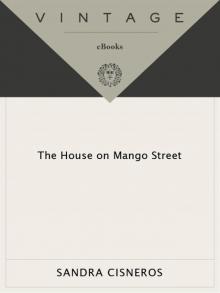 The House on Mango Street
The House on Mango Street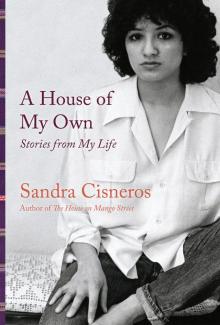 A House of My Own: Stories From My Life
A House of My Own: Stories From My Life Loose Woman
Loose Woman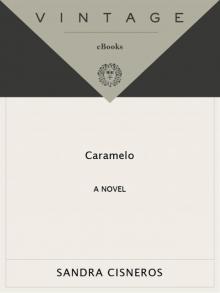 Caramelo
Caramelo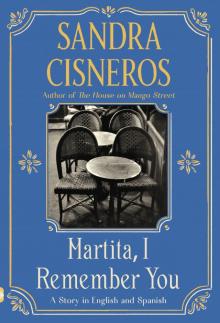 Martita, I Remember You/Martita, te recuerdo
Martita, I Remember You/Martita, te recuerdo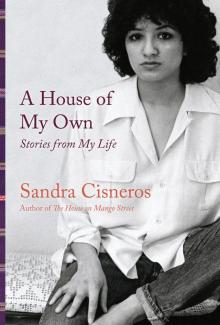 A House of My Own
A House of My Own My Wicked Wicked Ways
My Wicked Wicked Ways